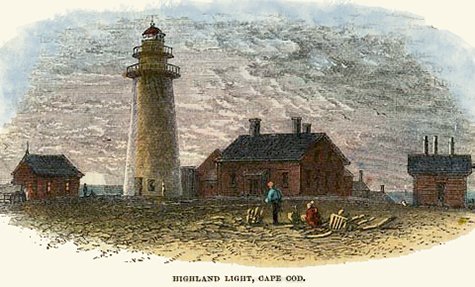
Visit the Highland Lighthouse Museum.  |
TruroThoreau's Cape Cod includes a chapter on Highland Light in Truro that he crafted from his research into its construction and operation during his visits here between 1849 and 1857. While his commentary on the lighthouse drew from various books and articles, as well as anecdotes he heard from local residents, he also made use of his expertise as a surveyor to measure the height of the building and calculate the rate of beach erosion to determine when the structure might have to be moved or replaced. Like the other chapters of Cape Cod, "Highland Light" integrated Thoreau's direct observations with information culled from an array of sources in history, geology, topography, botany, and other fields. For instance, as he traveled by train, or "the cars," as he put it, then by stagecoach as he and his companion, Ellery Channing, made their way to Truro, he consulted the eighth volume of the Massachusetts Historical Collections, which he had brought along from Concord to aid his study of the towns along his route. Likewise, in line with his lifelong interest in cartography, he referenced A Map Of The Extremity Of Cape Cod Including the Townships of Provincetown & Truro, which had become the authoritative chart of the region after it was published in 1836 under the supervision of Maj. J.D. Graham, a talented topographical engineer working under a commission from Congress. Rather than quoting or referencing such works to lend authority to his text, Thoreau generally used them as sounding boards to amplify his own experience. In this respect, Cape Cod hearkens back to his early essays, especially "The Natural History of Massachusetts," a wide-ranging book review that appeared in The Dial in 1842. The review addressed, as he indicated in a footnote to the title, Reports — on the Fishes, Reptiles, and Birds; the Herbaceous Plants and Quadrupeds; the Insects Injurious to Vegetation; and the Invertebrate Animals of Massachusetts. Having obtained these reports at the Statehouse, Emerson carried them back to Concord with the express purpose of setting Thoreau "on the good track of giving an account of them in the Dial." As Emerson undoubtedly predicted, Thoreau's account was much more a meditation on nature and nature writing than it was a commentary on the reports. Thus it provides an interesting preview of the method and purpose he followed in composing Cape Cod twenty years later. "The Natural History of Massachusetts" begins, not with any mention of the books that Thoreau was reviewing, but with a tribute to the tonic effects of reading J.J. Audubon:
Cape Cod was clearly designed to perform a similar service, that is, not intended, in the manner of other travel books, to guide anyone along the same path, but to be itself an invigorating interior journey. And for all of its references to Humboldt, Darwin, and others whom the nineteenth century described as "men of science," it was not a collection of empirical observations about the plants, birds, people, or any other natural phenomenon he encountered on his way, but was instead a literary performance. Of course, Thoreau's poetic and expansive approach to travel writing did not please all of his readers, and he was taken to task by residents of Cape Cod who felt that he had been too unkind in his descriptions of women and too harsh in emphasizing the barrenness he saw from his stagecoach window. And some who recognized his literary aims probably still failed to appreciate what he hoped to achieve in describing his travels, and responded to Cape Cod much as a reviewer in Godey's Lady's Book did to a Week on the Concord and Merrimack Rivers: "Those who have read 'Margaret Smith's Journal,' will be at no loss in settling the authorship of this clever and interesting work. Mr. Whittier touches all his themes with the true poet's wand...It is just the book to read in the idleness of summer, when wishing to enjoy the pleasures of journeying, without the inconvenience which the actual packing up and going off in hot steamboats and dusty cars occasion. Read it, and see," September, 1849. |










